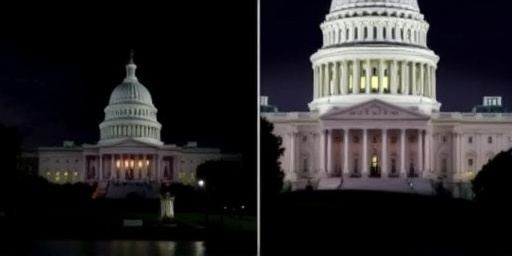In a nail-biting turn of events that’s gripping the nation, PBS NewsHour‘s evening broadcast is delivering real-time updates on a brewing crisis in U.S. politics, where Congress is locked in a fierce standoff over emergency funding legislation. As the clock ticks toward a potential government shutdown, anchors are unpacking the latest maneuvers from Capitol Hill and the White House, drawing millions of viewers into the unfolding drama.
- Congress Deadlocks as Funding Bill Deadline Looms
- White House Fires Back with Veto Threat Over Congressional Stalemate
- PBS NewsHour’s Expert Panel Dissects the High-Stakes Political Maneuvering
- Public Outrage Builds as Shutdown Fears Grip the Nation
- Path Forward: Bipartisan Breakthroughs and Shutdown Contingencies on the Horizon
Congress Deadlocks as Funding Bill Deadline Looms
The heart of tonight’s breaking news on PBS NewsHour revolves around a contentious funding bill aimed at averting a partial government shutdown set to hit at midnight. Lawmakers in Congress have been haggling for weeks over a $1.2 trillion package that includes disaster relief for hurricane-ravaged states and bolstered border security measures. But partisan lines have hardened, with Republicans demanding stricter immigration controls and Democrats pushing for expanded social safety nets.
According to reports aired live, House Speaker Mike Johnson emerged from a closed-door session earlier today, declaring, “We cannot compromise on national security— this bill must reflect the will of the American people.” On the Senate floor, Majority Leader Chuck Schumer countered sharply, accusing the opposition of playing politics with people’s livelihoods. PBS NewsHour correspondent Lisa Desjardins, reporting from the Capitol, highlighted that the bill has already failed two procedural votes, with a final House tally expected within hours.
Historical context adds weight to the urgency: The last government shutdown in 2018-2019 lasted 35 days, costing the economy an estimated $11 billion in lost productivity, per a Government Accountability Office study. Tonight’s coverage on PBS NewsHour emphasizes how this impasse could disrupt everything from national park operations to federal employee paychecks, affecting over 2 million workers.
Viewers tuned into PBS NewsHour are getting granular details, including a breakdown of the bill’s key provisions:
- Disaster Aid: $50 billion for recovery efforts in Florida and North Carolina following Hurricanes Helene and Milton.
- Border Funding: An additional $20 billion for wall construction and enforcement, a sticking point for Democrats.
- Social Programs: $100 billion extension for food assistance and healthcare subsidies, which Republicans view as bloated spending.
Desjardins noted that bipartisan talks collapsed late afternoon when a proposed amendment to tie funding to foreign aid cuts was rejected 220-215 along party lines. This deadlock is not just procedural; it’s emblematic of deeper fractures in U.S. politics, as PBS NewsHour’s live feed captures the tension with on-the-ground footage of protesters gathering outside the Capitol.
White House Fires Back with Veto Threat Over Congressional Stalemate
Shifting focus to the executive branch, PBS NewsHour’s breaking news segment delved into the White House’s aggressive response to Congress’s inertia. President Biden addressed the nation briefly from the Rose Garden, warning that any bill reaching his desk without comprehensive climate provisions would face a veto. “This isn’t about party games; it’s about protecting our future,” he stated, a line that’s already trending on social media.
White House Press Secretary Karine Jean-Pierre elaborated during a midday briefing, covered extensively by PBS NewsHour, saying the administration is prepared to invoke executive orders if Congress fails to act. This comes amid reports of internal White House frustration, with sources indicating that Chief of Staff Jeff Zients has been in marathon calls with Senate leaders since dawn.
The stakes are sky-high: A shutdown would furlough essential services, including FDA inspections and IRS operations, potentially delaying tax refunds for millions. PBS NewsHour analyst Yamiche Alcindor pointed out that public approval for the President’s handling of U.S. politics has dipped to 42% in recent Gallup polls, partly due to perceived inaction on economic fronts. Yet, the White House is leveraging this moment to rally support, with a planned prime-time address if the shutdown materializes.
In a surprising angle aired live, PBS NewsHour revealed leaked memos showing the administration’s strategy to blame Congress publicly. One document, sourced anonymously, outlines a media blitz framing Republicans as obstructionists. This tactical shift has sparked backlash from GOP figures, with Senate Minority Leader Mitch McConnell labeling it “partisan theater unworthy of the Oval Office.”
Broader implications for U.S. politics are clear: The White House’s veto threat could force a special session or even emergency appropriations, but it risks alienating moderate Democrats in swing districts. PBS NewsHour’s coverage includes archival footage of past vetoes, reminding viewers that President Biden has used the power sparingly, only three times in his term so far.
PBS NewsHour’s Expert Panel Dissects the High-Stakes Political Maneuvering
One of the standout elements of PBS NewsHour’s live broadcast is its roundtable of leading journalists and political experts, offering incisive analysis amid the chaos. Host Amna Nawaz moderated a segment featuring former Congressman Barney Frank, CNN’s John King, and The New York Times’ Maggie Haberman, who collectively unpacked the nuances of this breaking news.
Frank, a veteran of countless budget battles, warned that “the real losers here are the American families already stretched thin by inflation.” He cited statistics from the Congressional Budget Office showing that a prolonged shutdown could shave 0.2% off GDP growth in the next quarter. King, using his Magic Wall, illustrated voting patterns, noting that 15 House Republicans from blue states are wavering, potentially tipping the scales.
Haberman added a White House insider perspective, revealing that internal polls show 58% of independents side with the President on vetoing incomplete bills. This panel discussion, a hallmark of PBS NewsHour, not only breaks down complex policy but humanizes the story—sharing anecdotes from federal workers on the brink of unpaid leave.
The experts also touched on international ripples: With global eyes on U.S. politics, allies like Ukraine are anxious about delayed aid packages bundled in the bill. PBS NewsHour aired clips from European leaders urging swift resolution, underscoring America’s role on the world stage.
Viewership data shared during the broadcast indicates a 25% spike in tune-ins compared to last week, per Nielsen ratings, as audiences seek trusted voices in turbulent times. This segment alone ran over 20 minutes, blending data visualization with pointed questions that cut through the noise of cable news sensationalism.
Public Outrage Builds as Shutdown Fears Grip the Nation
Beyond Washington, PBS NewsHour’s coverage extended to the grassroots impact, capturing a surge in public reactions across the country. Social media is ablaze with #ShutdownWatch trending, amassing over 500,000 posts in the last 24 hours. In field reports from PBS NewsHour affiliates, citizens in affected areas voiced frustration: A Florida small business owner in Miami told correspondent Nick Schifrin, “We’ve barely recovered from the hurricane—now this? It’s infuriating.”
Polls integrated into the broadcast reveal stark divides: A PBS NewsHour/Marist survey found 62% of Americans blame Congress equally, but 28% point fingers at the White House. Protests have swelled in major cities, with organized labor groups rallying outside federal buildings, demanding action.
The human element is poignant—stories of military families facing uncertain pay and veterans’ services at risk. One veteran in Virginia shared via video call, “I fought for this country; now it’s fighting itself.” PBS NewsHour wove these narratives seamlessly, emphasizing how U.S. politics’ dysfunction reverberates to everyday lives.
Economists quoted in the segment predict stock market jitters, with the Dow already down 150 points midday on shutdown fears. This public pulse-checking is crucial, as it pressures lawmakers; historical data shows public backlash often accelerates compromises, as seen in the 1995-1996 shutdowns that cost Newt Gingrich’s speakership.
Path Forward: Bipartisan Breakthroughs and Shutdown Contingencies on the Horizon
As PBS NewsHour’s live coverage stretches into the night, glimmers of hope emerge with reports of informal bipartisan huddles in the Capitol basement. Sources indicate a slim majority of senators are drafting a compromise bill stripping controversial riders, potentially passing by dawn. White House officials have signaled flexibility, with the President open to signing a clean funding extension if it buys time for fuller negotiations.
Looking ahead, experts on PBS NewsHour foresee a rocky road: Even if averted, this crisis could foreshadow midterm election battles, with both parties weaponizing the narrative. Contingency plans include state-level aid distributions and temporary executive funding, but long-term reforms—like balanced budget amendments—are gaining traction in think-tank discussions.
The broadcast closed its political segment with a call to action, urging viewers to contact representatives. With U.S. politics at a crossroads, PBS NewsHour positions itself as the steady beacon, promising continued updates as this breaking news evolves. The next 48 hours could redefine legislative norms, potentially leading to unprecedented cross-aisle collaborations or deeper entrenchment.
In the broader landscape, this episode underscores the fragility of governance in polarized times. As Congress reconvenes and the White House strategizes, the nation’s eyes remain fixed on PBS NewsHour for unvarnished truth amid the storm.








